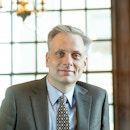Face to Face: The Special Ways of Our Social Minds and Brains
- Speaker
-
 Winrich Freiwald, Ph.D.Assistant Professor, Rockefeller University
Winrich Freiwald, Ph.D.Assistant Professor, Rockefeller University
Presidential Lectures are a series of free public colloquia spotlighting groundbreaking research across four themes: neuroscience and autism science, physics, biology, and mathematics and computer science. These curated, high-level scientific talks feature leading scientists and mathematicians and are designed to foster discussion and drive discovery within the New York City research community. We invite those interested in these topics to join us for this weekly lecture series.
Humans and all primates are social. Our primate sociality is a special one: it centers around the face as an active interface of social communication and connects to social cognitive abilities that look deeper than the surface of the face. Understanding the complex brains that make this possible offers insights into our human nature, its origins and hope for treating the many disorders afflicting social behavior.
In this Presidential Lecture, Winrich Freiwald will discuss the organization and function of the social brain and its special connection to the face. From a network of brain areas in the visual system that is exclusively specialized to analyze faces to a network of areas that controls the movements of the face, primate brains have evolved specialized circuitry to support specialized social functions. The different functions of the social brain can now be traced through this specialized network, and Freiwald will take one such tour from the analysis of faces to the memory of people to high-level social cognitive functions. He will then discuss how these discoveries shape our understanding of our brains and minds.
